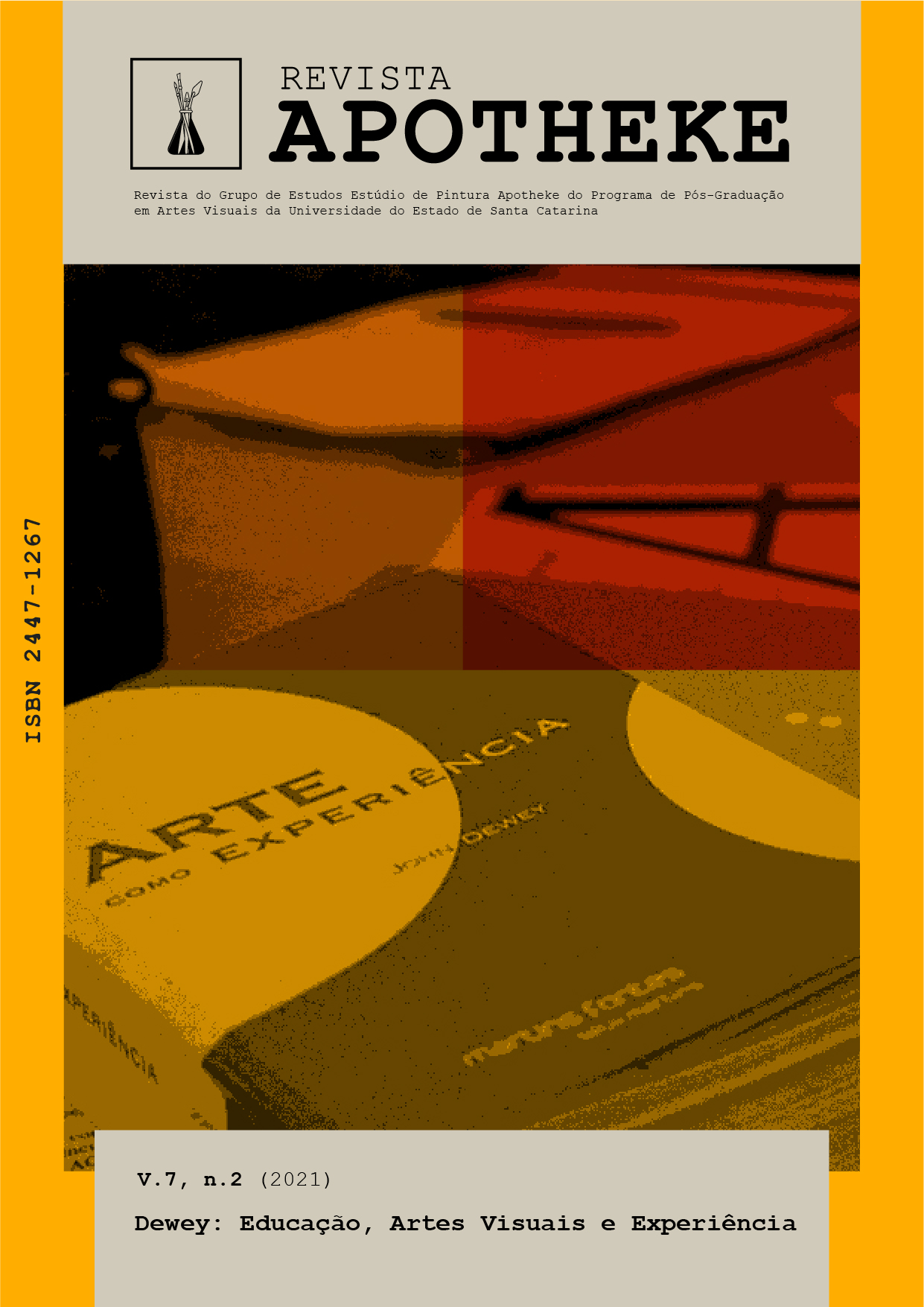Dewey e a experiência estética: uma contribuição ao Ensino de Arte
DOI:
https://doi.org/10.5965/24471267722021028Palavras-chave:
John Dewey, Teoria estética, Ensino de arte, Experimento de pensamento, dramaResumo
O objetivo deste artigo é oferecer contribuições ao ensino de arte por meio da teoria estética de John Dewey, realizando um experimento de pensamento – narrativa que emprega técnicas da literatura ficcional – que se efetua na forma de um drama – recurso didático que leva o aprendiz a um cenário fictício no qual se desenrola uma ação educativa. A primeira seção apresenta a teoria deweyana, enfatizando os conceitos de experiência, situação problemática e reflexão. A segunda seção apresenta um drama em que uma professora de educação infantil reflete sobre as suas experiências com a arte e busca solução para um problema: considerando que suas próprias experiências artísticas sempre foram negativas, como ensinar arte para seus alunos? O artigo põe a professora dentro de um experimento de pensamento, no qual ela conhece as teses de Dewey e obtém resposta para seu problema. A conclusão do artigo sugere que os professores de arte se sintam motivados a ter experiência semelhante à da professora.
Downloads
Referências
ALEXANDER, Thomas M. The art of life: Dewey’s aesthetics. In: HICKMAN, Larry A. (Org.). Readen Dewey: interpretation for a postmodern generation. Indiana: Indiana University, 1998.
BENTLEY, Arthur F.; DEWEY, John. Knowing and the known. The later works, 1925-1953. In: BOYDSTON, Jo Ann (Org.). The collected works of John Dewey, 1882-1953. Volume 16: 1948. Carbondale: Southern Illinois University, 2008a.
CRICK, Nathan. John Dewey’s aesthetics of communication. Southern Communication Journal, Philadelphia, v. 69, n. 4, p. 303-319, 2004.
CRICK, Nathan. Democracy and rhetoric: John Dewey on the arts of becoming. Columbia: University of South Carolina, 2010.
CRICK, Nathan. Rhetoric and power: the drama of classical Greek. Columbia: University of South Carolina, 2015.
DEWEY, John. Democracia e educação: introdução à filosofia da educação. Tradução Godofredo Rangel e Anísio Teixeira. 3. ed. São Paulo: Nacional, 1959.
DEWEY, John. Experiência e educação. Tradução de Anísio Teixeira. São Paulo: Nacional, 1971.
DEWEY, John. How we think. The Middle Works, 1899-1924. In: BOYDSTON, Jo Ann (Org.). The collected works of John Dewey, 1882-1953. Volume 6: 1910. Carbondale: Southern Illinois University, 2003.
DEWEY, John. Art as experience. The later works, 1925-1953. In: BOYDSTON, Jo Ann (Org.). The collected works of John Dewey, 1882-1953. Volume 10: 1934. Carbondale: Southern Illinois University, 2008b.
DEWEY, John. Time and individuality. The later works, 1925-1953. In: BOYDSTON, Jo Ann (Org.). The collected works of John Dewey, 1882-1953. Volume 14: 1940, p. 98-114. Carbondale: Southern Illinois University, 2008c.
DEWEY, John. Experience and nature. The later works, 1925-1953. In: BOYDSTON, Jo Ann (Org.). The collected works of John Dewey, 1882-1953. Volume 1: 1925. Carbondale: Southern Illinois University, 2008d.
DEWEY, John. Arte como experiência. Tradução Vera Ribeiro. São Paulo: Martins Fontes, 2010.
DEWEY, John. Lectures in the philosophy of education. New York: Random House, 1966.
ELGIN, Catherine Z. Fiction as thought experiment. Perspectives on Science, Cambridge, v. 22, n. 2, p. 221-241, 2014.
JOHNSTON, James Scott. Inquiry and education. John Dewey and the quest for democracy.: New York: State University of New York, 2006.
MARCONDES, Ofélia Maria. Dewey: estética social e educação democrática. 2017. 176. Tese (Doutorado em Filosofia da Educação). Faculdade de Educação, Universidade de São Paulo, São Paulo, 2017.
MIETTINEN, Reijo. The concept of experiential learning and John Dewey’s theory of reflective thought and action. International Journal of Lifelong Education, v. 1, n. 19, p. 54-72, 2000.
SILVA, Tatiane; CUNHA, Marcus Vinicius. Educação, comunicação e imaginação em John Dewey: contribuições teóricas e práticas. Revista Brasileira de Estudos Pedagógicos, Brasília, 2021 (no prelo).
SHUSTERMAN, Richard. Aesthetic experience: from analysis to Eros. In: SHUSTERMAN, Richard; TOMLIN, Adele. Aesthetic experience. New York: Routledge, 2008. p. 79-97
STROUD, Scott R. Dewey on art as evocative communication. Education and Culture. v. 2, n. 23, 2007. p. 6-26.
STROUD, Scott R. The art of experience: Dewey on the aesthetic. In: WOJCIECH, Malecki (org.). Practicing pragmatism aesthetics: critical perspective on the arts. Amsterdam: Rodopi, 2014, p. 33-46.
Downloads
Publicado
Como Citar
Edição
Seção
Licença
Os autores de trabalhos submetidos à Revista APOTHEKE autorizam sua publicação em meio físico e eletrônico, unicamente para fins acadêmicos, podendo ser reproduzidos desde que citada a fonte. Os mesmos, atestam sua originalidade, autoria e ineditismo.
Os artigos publicados pela revista são de uso gratuito, destinados a aplicações
acadêmicas e não comerciais. Os direitos autorais são todos cedidos à revista. Os artigos cujos autores são identificados representam a expressão do ponto de vista de seus autores e não a posição oficial da Revista Apotheke. O(s) autor(es) se compromete(m) a sempre que publicar material referente ao artigo publicado na Revista Apotheke mencionar a referida publicação da seguinte forma:
"Este artigo foi publicado originalmente pela revista Apotheke em seu volume (colocar o volume), número (colocar o número) no ano de (colocar o ano) e pode ser acessado em: http://www.revistas.udesc.br/index.php/APOTHEKE/index"
É responsabilidade dos autores a obtenção da permissão por escrito para usar em seus artigos materiais protegidos pela Lei de Direitos Autorais. A revista Apotheke não é responsável por quebras de direitos autorais feitas por seus colaboradores.
Os autores mantêm os direitos autorais e concedem à revista o direito de primeira publicação, com o trabalho licenciado sob Licença Creative Commons do tipo atribuição BY-NC:
Atribuição (BY): os licenciados têm o direito de copiar, distribuir, exibir e executar a obra e fazer trabalhos derivados dela, conquanto que deem créditos devidos ao autor ou licenciador, na maneira especificada por estes.
Uso Não comercial (NC): os licenciados podem copiar, distribuir, exibir e executar a obra e fazer trabalhos derivados dela, desde que sejam para fins não comerciais.
Após a publicação dos artigos, os autores permanecem com os direitos autorais e de republicação do texto.




